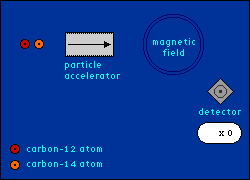
|

|
Detection Section (What's Your Deflection?) Back to The Dating Game If you've been reading the sections of this Hot Science in order, you already know that, to determine the age of an object through radiocarbon dating, you need to know the amount of carbon-14 that the once-living organic specimen started off with as well as the rate that carbon-14 decays, both of which we do know. All that's left to determine is the ratio between carbon-12 atoms and carbon-14 atoms within the specimen to be dated. How is this done?  One way is to use a particle accelerator. Here's how the
method works:
One way is to use a particle accelerator. Here's how the
method works:All of the carbon atoms from a small sample of the specimen are fed through the accelerator. The speeding atoms then pass through a magnetic field. The magnetic field deflects all the atoms, but to varying degrees. A detector—one that can count any type of carbon atom—is situated in a position that only the carbon-14 atoms reach. The detector, therefore, counts only the carbon-14 atoms within the sample. With the total number of carbon-14 atoms counted and the knowledge of the total number of carbon atoms, one can determine the ratio of carbon-12 to carbon-14. How far off this ratio is from the initial carbon-12 to carbon-14 ratio (which is, by the way, about one trillion to one), reveals how much of the carbon-14 has decayed. Then all that's left to be done is to figure out, based on carbon-14's half-life of 5,730 years, how much time has elapsed. Actually, it's a little more complicated than that. The radiocarbon date doesn't match up exactly with actual years elapsed. One reason is that the amount of carbon-14 in the atmosphere has not always been constant. But one can make adjustments to the date, and if the age of the item is 40,000 years old or younger, one can arrive at a relatively accurate figure. Does Race Exist? | Meet Kennewick Man Claims for the Remains | The Dating Game | Resources Transcript | Site Map | Mystery of the First Americans Home Editor's Picks | Previous Sites | Join Us/E-mail | TV/Web Schedule About NOVA | Teachers | Site Map | Shop | Jobs | Search | To print PBS Online | NOVA Online | WGBH © | Updated November 2000 |